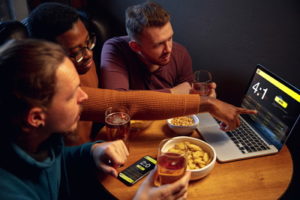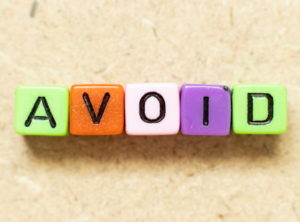 Regardless of the subject matter, most of us want to either impress our friends or else get one over on them. There is a reason why fitness watches allow you to link up with your friends, for example, with the makers knowing that you’re more likely to use the product if you see that someone from work went for a run last night, say. Sometimes such pressure and a sense of competition is a good thing; after all, being fitter will never really be detrimental to any part of your life. Sometimes, however, it can be bad, such as with gambling.
Regardless of the subject matter, most of us want to either impress our friends or else get one over on them. There is a reason why fitness watches allow you to link up with your friends, for example, with the makers knowing that you’re more likely to use the product if you see that someone from work went for a run last night, say. Sometimes such pressure and a sense of competition is a good thing; after all, being fitter will never really be detrimental to any part of your life. Sometimes, however, it can be bad, such as with gambling.
If you live in a world in which you and your friends often compete with each other, it isn’t out of the realms of the possible that you might do so over gambling as much as anything else. Has one of your friends placed a bigger bet than you? Is one of the group winning on a more regular basis? Is there someone you know that constantly brags about their winnings? Any one of those things might cause you to bet more or take more risks than you usually would, such is the social pressure that can sometimes come with placing bets.
Issues With Gambling Can Start Young
 Young people are naturally inclined to want to get one up on their peers. It is hardly a surprise to learn that younger people, especially males, can be competitive. Whilst they shouldn’t legally be able to place a bet until they are aged 18 or over, the reality is that many young people place bets well before that. Most of the time, these are bets placed with their friends over something like who can run the furthest, finish their lunch the quickest or get sent out of the classroom first by the teacher, for example.
Young people are naturally inclined to want to get one up on their peers. It is hardly a surprise to learn that younger people, especially males, can be competitive. Whilst they shouldn’t legally be able to place a bet until they are aged 18 or over, the reality is that many young people place bets well before that. Most of the time, these are bets placed with their friends over something like who can run the furthest, finish their lunch the quickest or get sent out of the classroom first by the teacher, for example.
Regardless of the why, the what can lead young people to have problematic relationships with gambling that they take into their older lives. With most children having gambled in some form or another by the time they’re 15, it is hardly a surprise that problem gamblers will often point to how they got started young as a part of the reason for their issues. It is easy to forget that gambling isn’t just betting on the roulette table at a casino or placing money on a horse to win whilst you’re visiting the racetrack with some friends.
Gambling often starts for young people when they play cards at home, for example, or their parent asks them what horse to put a pound on when the Grand National rolls around. Perhaps you’ve bought a scratch card and given it to your youngest to scratch off. Despite moves being made to limit it, children are often exposed to gambling adverts whilst waiting for a Premier League match to start or once the full-time whistle has been blown. These are all the ways that young people engage with gambling, then taking that into conversations with their peers.
Imagine a scenario in which a teenager has helped their mum to scratch off the panel on a scratch card at the weekend that won £20 from a £1 purchase. That is the sort of thing that most adolescents would talk about ad-infinitum with their friends, who would often then want to be involved in such a thing themselves. They might not be able to persuade their own parents to buy a scratch card, but maybe they look old enough themselves or have an older sibling that is more than willing to get involved and buy a scratch card for them.
Suddenly the idea of competition and peer pressure in gambling in young people becomes clear. There is a clear pathway for young people to go up against their peers in terms of getting involved with betting and gambling, communicating with each other via messaging services like Twitter or WhatsApp to talk about how they bought a scratch card or went on an online casino. As a result, others in the group will feel as though they’ve got to do something similar in order to remain part of the ‘it’ crowd, or to be social leaders in their group.
We’re All Susceptible To Peer Pressure
 Whilst it is likely for many that their relationship with gambling and competition started early, the simple truth is that we’re all liable to fall foul of peer pressure. Have you ever been to the casino with a friend, for example, who has pressured you to place bets or wager more money than you were planning to? That is peer pressure in action and it takes a strong-willed person not to fall foul of it. Sometimes peer pressure is a subtle thing, whilst on other occasions it is very much not subtle but still likely to cause an issue.
Whilst it is likely for many that their relationship with gambling and competition started early, the simple truth is that we’re all liable to fall foul of peer pressure. Have you ever been to the casino with a friend, for example, who has pressured you to place bets or wager more money than you were planning to? That is peer pressure in action and it takes a strong-willed person not to fall foul of it. Sometimes peer pressure is a subtle thing, whilst on other occasions it is very much not subtle but still likely to cause an issue.
Someone that has an unhealthy relationship with gambling might work really hard to not place bets. One day their work day out is a trip to a horse racing venue, which they go on because they feel as though it is the right thing to do from a social point of view. Being in such an environment, as well as being surrounded by friends and colleagues that are placing bets, leads them to place a few of their own. Suddenly, said person has disappeared down a whole of placing bets on a daily basis, losing the control that they had.
This isn’t exactly an unlikely scenario for someone to find themselves in, yet is the perfect demonstration of how peer pressure can lead someone to do something that they haven’t wanted to. It isn’t a major form of pressure being put on the person in question, but because they haven’t had a good experience with gambling in the past, it ends up unleashing a host of demons that they’ve had to work hard to keep suppressed in the past. It is an extreme example, but an understandable one that many can imagine happening.
Betting More Than You Want To
 Let us imagine a slight tweak to that scenario, in which the person concerned has never had a problem with gambling. Instead, they don’t tend to bet very often and are therefore dependent on a work colleague or friend to teach them how best to go about the process of placing bets when on the day out at the racecourse. Because they don’t have a wealth of experience of what they’re doing, they see their friend or colleague betting large sums of money and figures that that is what they are supposed to do, copying the actions of another.
Let us imagine a slight tweak to that scenario, in which the person concerned has never had a problem with gambling. Instead, they don’t tend to bet very often and are therefore dependent on a work colleague or friend to teach them how best to go about the process of placing bets when on the day out at the racecourse. Because they don’t have a wealth of experience of what they’re doing, they see their friend or colleague betting large sums of money and figures that that is what they are supposed to do, copying the actions of another.
Suddenly our hero has bet all of their money for the day by the time that the second race has taken place, losing it all. They are now left with two options: call it a day on their betting or head to the cash machine to take out more money. They opt for the latter because all of their friends and work colleagues are betting, so they don’t want to be left out. Now they’re betting with money that they didn’t plan to lose, putting themselves in a situation where losing the additional money will cause them all sorts of personal issues.
Again, that is a scenario that it isn’t hard to imagine yourself in. Perhaps you replace the racecourse with a casino, say, or a night at the dogs. Whatever the scenario that you find yourself in, seeing your friends or people you know from work bet large sums of money can cause some people to think that they have to do the same thing. They are not being pressured to do so, but the very act of everyone else doing it means that they feel as though they should in order to avoid being left out or not being part of what’s happening.
Gambling Is Normalised By Others

For those that are able to gamble healthily and sensibly, having a flutter can be part of their routine without much of a problem. Betting isn’t in and of itself a problem, with the key rules being that you should only bet on a topic that you understand and you should only bet with money that you can afford to lose. Following these principles will mean that you’re less likely to lose money and that the money that you do lose won’t have a major impact on your life. Unfortunately, they are not principles that everyone is able to stick to.
The sad reality is that many people within a friendship group placing bets and gambling regularly is likely to normalise the idea of betting to most. With social influences being one of the key drivers of gambling as an activity, the idea of gambling being normalised through our friendship groups and societies can therefore be somewhat problematic. Imagine never having placed a bet before but constantly hearing your friends talk about the bets that they placed over the weekend and how much money they won, for example.
Whilst some will be able to continue not betting, there are vast numbers of people who would be caught up in the idea of placing bets of their own in order to be part of the conversation. Of this group, some will be able to control their urges whilst others will end up betting more money and more regularly than they can afford to. It is a shame that such people will soon find themselves in a situation whereby they have become problem gamblers, but that is the reality of betting as a social activity, especially when engaged in because of the work of others.
When we are with are friends we also tend to be in a positive mood and that can also influence how much we gamble. Being in a good mood is not a bad thing certainly but it can make is overconfident and more liable to take more risks. We want to win even more so because we can share those wins with our friends, but the desire to win can often override sound judgement. Ultimately we all have to take responsibility for our own bets.
It Can Happen Online Too
 Here we have been largely focused on the affects of social pressure in real world situations but this is something that is also present online. Many people will talk about betting online on platforms like Twitter and Facebook and will share potential wagers, odds, stakes and tips with their ‘friends’. This can also induce pressure on you to follow your contacts, believing that you have to place these bets in case they win and you end up losing out (financially and socially).
Here we have been largely focused on the affects of social pressure in real world situations but this is something that is also present online. Many people will talk about betting online on platforms like Twitter and Facebook and will share potential wagers, odds, stakes and tips with their ‘friends’. This can also induce pressure on you to follow your contacts, believing that you have to place these bets in case they win and you end up losing out (financially and socially).
Indeed, a lot of people will follow and interact online with gambling companies themselves who will post odds, tips and special offers. This can also lead to social pressure to gamble, especially as others are commenting on the features, prices and promotions.
There are also companies and influencers you can sign up to that will give you tips and tell you to place certain bets or accumulators. Again we are putting ourselves in the position where we make ourselves liable to outside pressures to place bets or bet more than we would naturally want to. Either way, whether online or in the real world, the outcomes can be the same. The best way to avoid this is to not join companies that offer betting tips or online groups that talk about bets – although, of course, that can be easier said than done for many people as these platforms in themselves have been shown to be addictive.
How To Avoid Social Pressure When Betting
 The truth is that there is no silver bullet to help people avoid falling foul of gambling as a result of social pressures. You will know for yourself how likely it is that you’ll be influenced by other people. Are you someone that is able to avoid falling foul of peer pressure, or do you often do things simply because others are doing it and you want to avoid the fear of missing out? If you fall into the latter category then it is sensible to have some plans in place to stop you from placing bets or gambling money that you don’t want to place or can’t afford to lose.
The truth is that there is no silver bullet to help people avoid falling foul of gambling as a result of social pressures. You will know for yourself how likely it is that you’ll be influenced by other people. Are you someone that is able to avoid falling foul of peer pressure, or do you often do things simply because others are doing it and you want to avoid the fear of missing out? If you fall into the latter category then it is sensible to have some plans in place to stop you from placing bets or gambling money that you don’t want to place or can’t afford to lose.
The first thing to do is to acknowledge that it is difficult to say no to others, especially if they’re part of our family or close friends. Do not beat yourself up because you’re fallen foul of social pressures. If you know that you’re going to struggle to say no when in certain situations, the best thing that you can do is either avoid those situations or else remove yourself from them when you realise that you’re falling foul of the social pressures. It is easier said than done, of course, but it is still something to aim for in the first instance.
If you sometimes find yourself in a position where others are actively encouraging you to place bets, one thing that you can do in preparation is have a series of excuses not to lined up. ‘I promised my other half I wouldn’t place a bet’ is a good place to start, though it is also a line that leaves you open to accusations of being ‘under the thumb’ or an equivalent phrase. You could tweak it to say that you ‘had a bet’ with your partner that you wouldn’t gamble, meaning that you have gambled, just not in the way that the other person wants.
There will almost certainly be others within the group environment that you find yourself in that won’t want to gamble. Many people are just keen to fit in and as soon as someone else says that they don’t want to bet, other voices will come out saying the same thing. Being brave enough to get the conversation started can soon see you become the spokesperson for a group of others, all of you supporting each other in your decision not to gamble. Knowing that others feel the same way can embolden you to make the right decisions.
